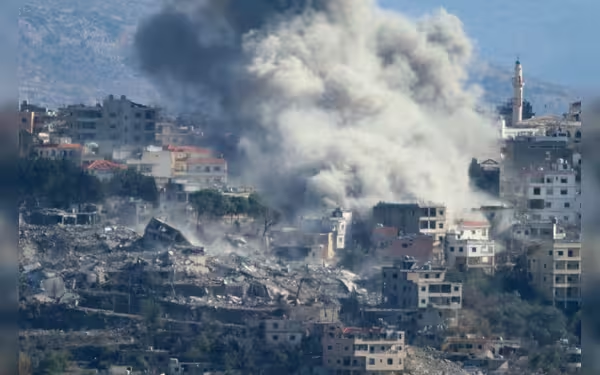Thursday, November 21, 2024 11:20 AM
Israeli Troops Advance Deep into Lebanon Amid Escalating Conflict
- Israeli troops reach strategic hill in southern Lebanon.
- Hezbollah retaliates, pushing back Israeli forces.
- Over 3,400 reported killed in Lebanon since conflict escalation.
 Image Credits: arabnewspk
Image Credits: arabnewspkIsraeli troops advance into Lebanon, facing Hezbollah resistance as casualties rise amid ongoing conflict and ceasefire discussions.
In recent weeks, the conflict between Israel and Hezbollah has escalated significantly, marking a troubling chapter in the ongoing tensions in the region. On October 1, Israeli ground forces launched an invasion into Lebanon, which has since led to fierce battles and a tragic loss of life. As of early Saturday, Israeli troops reached their deepest point in Lebanon since the invasion began, capturing a strategic hill in the southern village of Chamaa, located approximately 5 kilometers from the Israeli border. However, this advance was short-lived, as they were pushed back after intense fighting with Hezbollah militants.
According to reports from Lebanese state media, the Israeli forces detonated the Shrine of Shimon the Prophet in Chamaa, along with several homes, before their withdrawal. This claim, however, has not been independently verified. The Israeli military, in a statement, indicated that their operations in southern Lebanon are "limited, localized, and targeted," but did not provide further comments regarding the reports from Lebanese media.
As the ground operations unfolded, Israeli warplanes intensified their bombardment of various areas in southern Lebanon, including the southern suburbs of Beirut and the port city of Tyre. One of the morning strikes targeted Dahiyeh, an area identified by the Israeli military as a Hezbollah stronghold. Residents were reportedly warned in advance of the attacks, but it remains unclear if there were any casualties.
The surge in violence coincides with ongoing discussions among Lebanese and Hezbollah officials regarding a draft proposal from the United States aimed at ending the conflict. Since late September, Israel has significantly ramped up its military actions in Lebanon, with the stated goal of crippling Hezbollah and halting its attacks on Israel. The toll of this conflict has been devastating, with more than 3,400 people reported killed in Lebanon due to Israeli fire, a staggering 80 percent of whom have died in the past eight weeks, according to Lebanon’s Health Ministry.
In a bid to mediate the situation, Lebanon’s caretaker prime minister has reportedly urged Iran to persuade Hezbollah to consider a ceasefire agreement with Israel. This proposal is based on UN Security Council resolution 1701, which previously ended hostilities between Israel and Hezbollah in 2006. The US ambassador to Lebanon has handed over a copy of the draft proposal to Parliament Speaker Nabih Berri, who is negotiating on behalf of Hezbollah. Berri has indicated that he will provide a response from Lebanon on Monday.
While discussions are ongoing, Berri has expressed concerns regarding certain aspects of the draft, particularly the inclusion of a committee to supervise the agreement that would involve members from Western countries. He firmly stated, "We will not accept any infringement of our sovereignty," emphasizing Lebanon's stance on maintaining its independence.
As the situation continues to unfold, there is also a parallel push to resolve the conflict between Israel and Hamas, which erupted after Palestinian militants attacked Israel on October 7, 2023. This attack resulted in the deaths of approximately 1,200 people, primarily civilians, and the abduction of 250 others. The UN Security Council has circulated a draft resolution calling for an "immediate, unconditional and permanent ceasefire" in Gaza, but the outcome remains uncertain, heavily influenced by the stance of the United States, Israel's closest ally.
The humanitarian impact of these conflicts is profound, with reports indicating that Israel's military actions in Gaza have resulted in over 43,000 deaths, a significant portion of whom are women and children. As the world watches these developments, the hope for a peaceful resolution remains a distant yet crucial goal. The ongoing violence not only affects those directly involved but also has far-reaching implications for regional stability and international relations.













